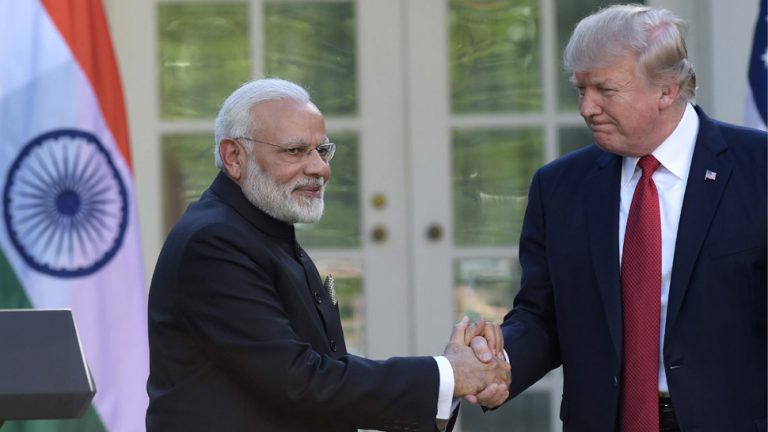
President Donald Trump on Saturday said he requested Prime Minister Narendra Modi to release orders placed by the United States with Indian pharmaceutical companies for hydroxychloroquine doses, which he has personally touted as a game-changer in the fight against the coronavirus.
Trump told reporters at the daily White House briefing on the coronavirus outbreak that he had call Modi and urged him to “release the amounts we ordered” and added, “they are giving it serious consideration”
Prime Minister Modi tweeted about the phone call but did not mention the American president specific request. He only said they had a “good discussion, and agreed to deploy the full strength of the India-US partnership to fight Covid-19”.
Late Saturday, the White House said in a readout of two leaders’ phone call that they discussed how the two countries can work together to combat the coronavirus pandemic and “agreed to remain in touch on the issue of global supply chains for critical pharmaceuticals and medical supplies and to ensure they continue to function as smoothly as possible during the global health crisis”.
India is one of the world’s largest manufacturers of hydroxychloroquine, a drug that has been used for decades to treat malaria and lupus. It banned the export of the it as active pharmaceutical ingredient (API, the molecule) and it formulations on March 25, around the time President Trump began talking about the need for it to treat Covid-19.
India is using the drug extensively as a prophylactic for healthcare professionals working on coronavirus patients.
The restriction, issued by the director general of foreign trade, was not blanket. An exception could be made, the notice said, on “humanitarian” grounds and on a case-to-care basis determined by the ministry of external affairs. And India has indeed made exceptions for Israel from restrictions announced earlier on a list of 26 drugs, according to news reports. It was not clear if exemptions for Israel included hydroxychloroquine.
This notification was amended and superseded by another issued on Saturday, which removed the exemptions altogether. “The export of hydroxychloroquine and formulations made from hydroxychloroquine, therefore, shall remain prohibited, without any exception,” the director general of foreign trade said in the new notification.
The implications of the new notification for President Trump’s “personal” plea to Prime Minister Modi could not be immediately ascertained but people familiar with the matter said it’s a government notification that can be overturned by the government if it so determined.
If India has surplus doses of the drug, they argued, it might want to allow the US orders at this time of emergency for a country struggling with an epidemic that has killed close to 8,500 people and infected more than 300,000. The long- and short-term implications of the “gesture” cannot be overstated, they added.
Faced with a fast depleting stockpile of medical supplies and equipment needed to deal with the rush of cases and fatalities, Trump has reached out to other countries as well. He recently called his South Korean counterpart Moon Jae-in for medical equipment and the Russians sent a planeload of supplies last week. Earlier Saturday, New York governor Andrew Cuomo announced getting a donation of 1,000 ventilators from China.
The size of the US order on “hold”, as the president called the ban, could not be immediately ascertained, but their importance to his cannot be underestimated. “They make large amounts of hydroxychloroquine, very large amounts, frankly,” the resident said, adding, “and they had a hold, because, you know, they have 1.5 billion people. and they (need) a lot of it”.
There is no proven evidence that hydroxychloroquine works against the coronavirus. There have been some studies and trials, but scientists and experts have said they were too small to determine its effectiveness. But physicians have been using it nevertheless, even in the United States.
President Trump has spoken of hydroxychloroquine as a potential “game-changer” many times, with experts of his coronavirus task force adding the usual cautionary note every time that the drug has no proven benefits for COVID-19 patients.
The US drug regulator, the Food and Drug Administration, granted “compassionate use” authorization for the use of hydroxychloroquine (or chloroquine), to be prescribed to severely ill patients in mid-March. Last week, the regulator gave it emergency-use authorization. And it is being tried on COVID-10 patients in New York City, the epicentre of the American outbreak.